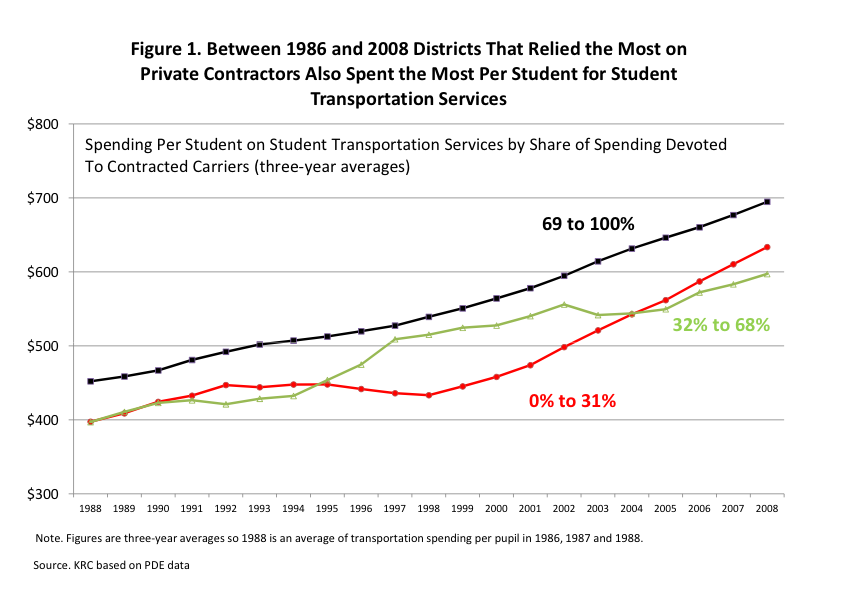KEYSTONE RESEARCH CENTER
Executive Summary
This study examines the cost of transportation services for Pennsylvania’s school districts, focusing especially on the impact on costs of contracting out. Using data from the Pennsylvania Department of Education from 1986 to 2008, the study statistically analyzes total costs, the costs to the state, and the costs to local school districts. On average 72% of transportation services were contracted out by Pennsylvania school districts in 2008, up from 62% in 1986.
In analyzing school district transportation costs, we control for the impact on costs of school district enrollment, fuel costs, spending for transportation of special education students, and the wealth and income of the school district. We find that:
- Contracting out significantly increases total costs. For example, if the “typical” district (with enrollment and other variables equal to the average for all districts) shifts from contracting out none of its transportation services to contracting out for all of its services, costs increase an estimated $223,861 (in 2008 dollars).
- Contracting out also increases costs to the state, in part because the state reimburses contracted transportation services at a higher rate than district self-provided services. In the typical district, increasing contracting out from zero to 100% increases costs to the state by $231,903.
- For local school districts, there is no statistically significant difference (at the 5% level) between what they pay for transportation services when they contract out versus when they self-provide transportation—in effect, the more generous state reimbursement of contracting out compensates for the increase in total costs.
In addition to the state’s more generous reimbursement for contracted transportation services, decisions to contract out are also driven in some cases by the lump sum that districts receive up front for selling their bus fleet. Contractors also reportedly “low ball” their prices when bidding for new contracts—i.e., promise lower costs than actually result. Analysis of a sub-sample of 29 districts that privatized transportation services between 1992 and 2001 reveals that these districts experienced a 26% increase in total transportation costs in the five years after contracting out compared to a 6% increase in the five years before contracting out. Most of the jump in costs took place in the first year after privatization. Despite higher costs, districts may not revert to self- provided services because the state’s more generous reimbursement of contractor services absorbs the increase. In addition, once districts sell their bus fleet, reverting back to self-provided services is impeded by the up-front cost of repurchasing a fleet. Lastly, school officials may be reluctant to publicize the increase in costs due to privatization.
Contracting out substantially increases state spending on transportation services. We estimate that if all districts switched to the self-supply of transportation services, total spending on student transportation services would fall by $78.3 million dollars with all of the cost savings accruing to the state.
Why does contracting out cost more than self-providing transportation services? While this requires further study, the general answer is that private contractors do not provide efficiencies sufficient to compensate for increases in costs associated with contracting out. These increases include contractor profits, the higher salaries of private contractors at the managerial and executive level, and the cost to school districts of monitoring contractors. Contracting can also be expensive because of lack of competition within the private industry in some areas. In addition, once a contract is in place, switching contractors or in-sourcing services may be disruptive, create managerial headaches, or impose financial transition costs. These transition costs give current contractors leverage when charging for unanticipated additional services or bargaining over contract renewal terms. These reasons that privatization costs more than self-providing services are not unique to the school bus transportation industry but arise with a wide range of privatized services.
Read full report (PDF) here: Runaway Spending
About The Keystone Research Center
keystoneresearch.org
“The Keystone Research Center was created to broaden public discussion on strategies to achieve a more prosperous and equitable Pennsylvania economy. As a research and policy development institute, the Keystone Research Center conducts original research, produces reports, and promotes public dialog that addresses important economic and civic problems, and proposes new policies to help resolve those problems. Established in 1996, Keystone operates through the collaborative efforts of Pennsylvania citizens drawn from academia, labor, religious and business organizations. Rather than simply outlining Pennsylvania’s problems, the Keystone Research Center is dedicated to using research and collaboration to propose workable policy alternatives. Over the last 15 years, the Keystone Research Center has become a leading source of independent analysis of Pennsylvania’s economy and public policy.”
Tags: Contractors, Keystone Research Center, Pennsylvania, schools, transportation







 RSS Feed
RSS Feed